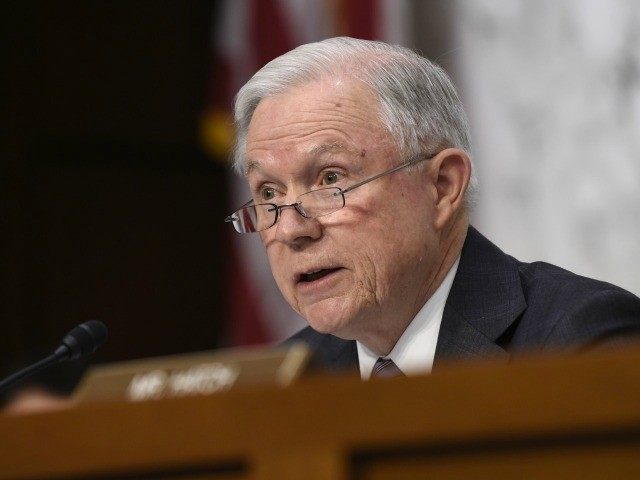Sen. Jeff Sessions (R-AL) said to Congress, “The American people don’t trust you” on Obamatrade deal.
On the issue of fast-track trade authority for President Obama, Sessions explained that the authority would be dangerous and would suspend Congress’s powers for the next six years, as Congress would only get an up or down vote on Obama’s trade negotiations and would not be allowed to make any amendments.
Sessions explained how fast-track authority throws off the balance of powers between the legislative and executive branch:
Under the fast-track procedure, the President—not Congress—writes implementing legislation for any yet-unseen global trade pact. That legislation, no matter its contents, cannot be amended in any fashion. No individual Member of Congress can alter any line of text, or remove a single provision that violates the will or intent of Congress. That legislation, once called up, is guaranteed a speedy path forward—only 20 hours of debate—and the vote threshold is lowered to a simple majority. No matter how far-reaching the global trade agreement, Congress cannot subject it to the 60 votes applied to important legislation or the 67 votes applied to treaties. Congress will have preapproved swift consideration of sweeping global pacts years before their text has been seen by a single member of this body.
In a letter to President Obama, Sessions called for him to explain how he plans to use his fast-track authority and how American workers will be impacted by his decisions.
Obama did not issue answer nor respond to Sessions’ letter. “And yet they want us to shut off debate,” Sessions responded.
“For too long, the United States has entered into trade deals on the promise of economic bounty, only to see workers impoverished and industries disappear,” Sessions said.
Sessions cites Daniel DiMicco — Chairman Emeritus of Nucor Steel — who said trade deals cause America to lower barriers to foreign imports, but that other countries retain barriers to American exports. DiMicco said this was an “enablement of foreign mercantilism.”
Sessions also used automobiles and a recent Wall Street Journal report about how the TPP could damage the U.S. auto sector story to make his point.
The WSJ wrote, “In the transportation sector, led by cars, the TPP could boost imports by an extra $30.8 billion by 2025, compared with an exports gain of $7.8 billion, according to a study co-written by Peter Petri, professor of international finance at Brandeis University.”
Sessions added that the American people have lived the results of failed trade deals and should be skeptical. He said”
The South Korean trade deal, for instance, which I supported—was promised to boost our exports by more than $10 billion—but ended increasing our exports less than $1 billion (.8 to be exact). Instead, the deal boosted South Korea imports to our country by more than $12 billion, nearly doubling our trade gap with them. This is not a small miss by our political and financial elites—it is a huge one. The projections weren’t even close.
“Now, they say: trust us. Give us six years of executive authority to pass any global deal we like (under fast-track procedure, no deal has ever before been blocked). Well, respectfully, the American people don’t trust you,” he added.
A recent PEW poll found that only 20 percent of Americans believe trade creates jobs. More than fifty percent said it destroys jobs. Furthermore, 45 percent of Americans say trade reduces wages.
Breitbart News previously reported that Sen. Elizabeth Warren (D-MA) and Sen. Joe Manchin (D-WV) moved Thursday for a bill that would make the text of the trade deal transparent and open to the public, as it has been kept in a room where only members of Congress could go to review the text, while not being allowed to discuss it in public or take notes on what it says.
“It is time for Congress to defend its shareholders: the American people. It is time to return to the regular order, to the principles of sound governance, and to assert—not surrender—the power of Congress to the overreaching chief executive. So I am therefore [not] going to be shutting off debate that actually has not yet even begun,” Sessions concluded.

COMMENTS
Please let us know if you're having issues with commenting.